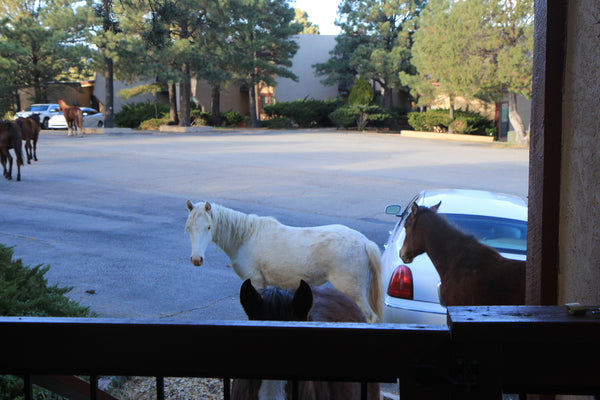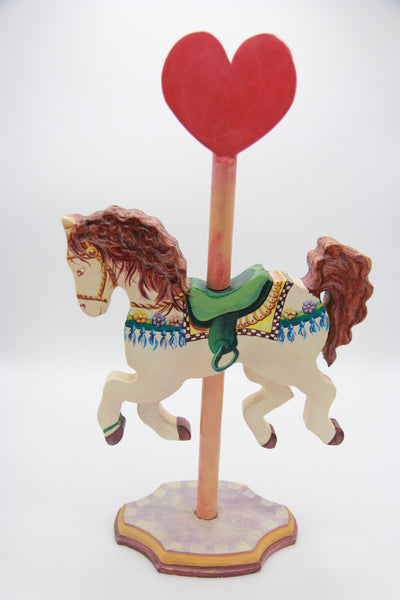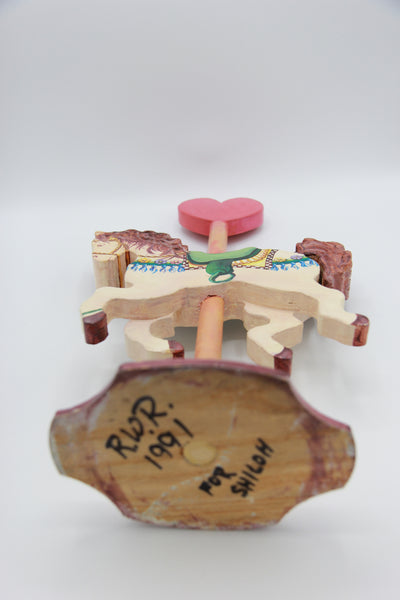
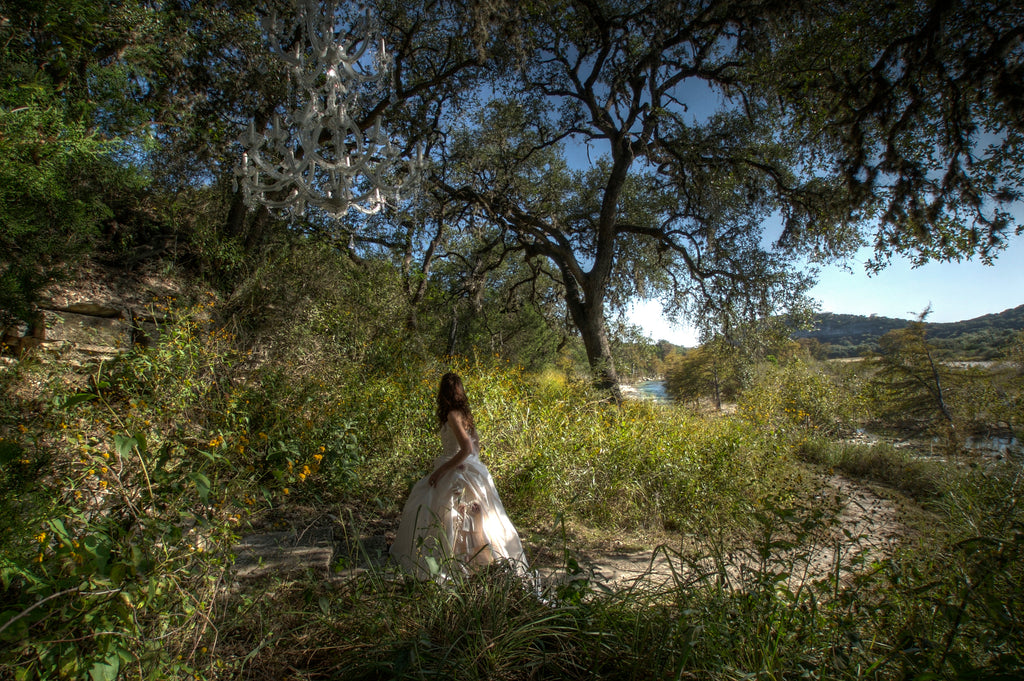
The river picture on the cover of On Being, was taken on 18 October 2007 on my parent's 44th wedding anniversary, '44 being the year my dad was born, and two days after John's 30th birthday (and together those years together (44 and 30) being the age my dad would pass at 74, and John's age being 30 and 2 days with 32 being the age John would be when I saw him for the first time) and when John was preparing to film Where the Light Is in less than two months that December. (The photo shoot that I created also included a vintage silk red dress and a Gibson guitar very similar to what he would use). I published the photograph on this book on 11 January 2019. It was taken up the highway a little more than ten miles of where I would go within seven days of this publishing to do a natural (green) burial of my dad. Both of these sites, the ranch where the interment took place, and the river, are opposite directions turning from the Ranch Road 1049, the road I take to leave the ranch for New Mexico. The number of the road is like the prophecy with my name, Genesis 49:10 and John's birthdate, 10/77 and just as this 2019 in July, after my father passed, I turned 49 on the 10th.
Penelope, whose name means the “bobbin” around which the epics are spun-i.e. the center of weaving of the epics--is also herself weaving a metaphorical “death shroud”--a veil between the worlds to be revealed, like the veil of her own skin to the eternal Being inside. She is weaving a reclamation of the lineage by the “death” of the imposters in her home and a revelation of the true line of Hermes, the trickster, messenger of the gods, and psychopomp between the worlds. These are realizations of the Songs, a mystery “rite” itself of the most transformative and important kind, the realizations of Being brought into awareness while in process and which ultimately lead to the realization of the divinity of Being, the breaking open of the sacred, and of the eternal of the feminine not unnaturally mis-born into mere object, appetite, greed, and form.
In the last decade before my dad passed I have been writing as the waiting Penelope (a rite in itself to learning Being internally), unraveling the untruths of social construct and conditioning and weaving the realizations of the epics into creation and writing, most concentrated since I began writing John Mayer in April 2010. I had taught Classical Literature at the university, and for many years it had stayed with me to figure it out, the mystery of Penelope lingering that could not simply only be what the scholars said she was, a symbol of loyalty. A mere three days before my dad passed I published On Being: Snow White and the Emergence of Presence and the Real Poetic, Unseen Visions of “Being” in the Woods, which contains the imagery of carousel horses all the way to Paris and even in the last pages, in the last few days before publishing, I had added an epilogue about Pygmalion and the message about him from my dad. That was on Friday, and he passed on Monday. Within the last hour that I had seen my dad in person in December, I had taken a picture of Pygmalion before leaving and also of a herd of antique horses that line the living room on the bookcases at the ranch. After 48 1/2 years, these were our last moments together.
In the mythology of Penelope before the Homeric epics, Penelope must choose between her father and leaving with Odysseus. This is significant because it is also choosing between types of cultures: her father is of Sparta, a warring culture, and the path with Odysseus is very different, a turning over of the worlds--as described by Lewis Hyde, the trickster “on the road.” At the point on the road at which Penelope decides to leave with Odysseus and the point at which she puts on her veil--which is a symbol to the eternal in her, her father builds a statue to Aidos, the goddess of modesty, respect, reverence, and what has been described by writers as a sense of shame (“a sense of not willing to do wrong”). This description is likely a limited expression of a deep sense of rightness of what had to be done and certainty of her knowing both of their eternal selves and destinies.
On Being was published on Friday before my dad’s passing on Monday. The photograph on the cover then became the symbol at the place of leaving my father and the old warring culture behind--even in the fact that my face is not seen--something that kept happening in my work. For example, many years ago when I worked on the movie set of The Ringer in Austin, I was downgraded from a featured part to an extra, and during a morning shoot I was moved further and further back in the cubicles for the opening office scene, and finally, when the camera was panning to go past me, the director made everyone stop and said to put a newspaper in front of my face. This is something I had written to John about because of synchronistic events with him, and also because the statue--the herma, the marker on the road of John where I was in 2004-2005--of SRV was directly across the street from where I had been filming, suggestive of what was in the offing and right by the water in downtown Austin where I would see John up the street on Red River and my life be changed forever.
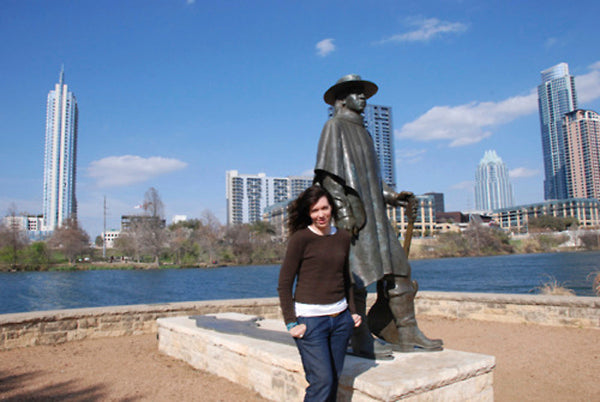
At Stevie Ray Vaughan's statue, Austin, Texas, 2013
Trying to take every detail of my biography, Taylor took this idea to coerce Tom Hooper, the director of Cats, to tell the media that he had not hired her for Les Misérables (2012) because he "couldn’t quite believe Taylor Swift was a girl people would overlook." (I write about why she was desperately trying to cast herself in Les Misérables in On Being.) When Taylor stole the design from 2007 for the photograph in 2011, of course the difference is that she showed her face--the opposite of Aidos and Penelope’s veil, and the road marker, a herma of a god marking a boundary crossed and of where the path began with Odysseus diverging from that culture, and Penelope herself marking the difference. Taylor had done this, showing her face, at the previous road marker as well by taking the office cubicle scene filmed in 2005 which had been at the SRV statue, for her video for "Ours" in 2011.
Helen, also from Sparta, never leaves that warring culture but carries its damages further, and her face is not a veil to the eternal, but to an actual crux of recognition of what is missing in her that Odysseus recognized well before Helen married Menelaus and then, as Odysseus foresaw about her--meaning he recognized her spirit long before anyone else did, she left to go in a self-seeking move to what she saw as more advantageous to the city of Troy, which is then destined, from the empty insides of their spirits, the symbol of their fall being the "hollow" Trojan "horse"--the empty spirit horse, significant of Troy and its unawareness (an awareness Odysseus had already shown about her character but went unheeded) in their protecting Helen, the one who will have them all killed with an emptiness and pent-up, unrequited and unrequitable energies inside, an empty symbol of the feminine based on surface appearances alone, just a surface face and an ungodly interior--to fall.
The path of the horses shown in Miracles at Isleta and Honoring my Dad were markedly, distinctly renascent in this moment of my dad passing, and it has been alive all along, and now marking a further truth beyond the black and white words of underestimated "fiction," an aliveness of the Song beyond anything expected or imagined. Thus, because of the "horses," spirit was being revealed. This is no dead art. Opening the cave art and all the happenings of the horses, as in Lady Gaga's horse passing, as she herself states, the horse being her very own soul and she having already just shown a connection with Joanne, and all of this at the understanding of the feminine, was more than epiphany, it is numinous. It is theophany and a very different realm operating openly. This is what the universe wants written. This is why I am on a mountain in nature in the secluded quiet reserve of space, inside and out, to listen and watch it happen close up from an inner stillness with which it itself is, also with a creative push, like the ancient Greeks believed, a genius or spirit visiting, urging on to write it, shaping circumstances so that it gets written. This comes from the like-minded Beings as well, like John who knows its beauty and its flow.
Whenever I ask a question of the universe, of the "Great Spirit," or of my dad and others, I get a highly Present, loving, creative, and distinct answers that go beyond what I could have planned or imagined. I have asked my dad "what it is like," if my other dogs are with him, in a funny moment where some paperwork is, and these among a series of things that have been distinctly answered in an observable, often sweet and humorous way. If ego were present I would be running out to the news media saying, "Look at me!" but this is such a reserved space and miraculous happenings, as the poet John Donne wrote, "'Twere profanation of our joys/ To tell the laity our love." It would be met with blankness. I have experienced this my whole life in telling people about wonder. There's a wish you hadn't said anything as your joy meets a wall. Untransformed people will look at you and be thinking, "identifying with their thoughts" the whole time, not present, and the energy that was expended on this pointless routine did not need to be exerted. The "rite," as even Plato and Socrates show, doesn't "tell." It cannot. Words cannot go here. It is witnessed within, and only within, in an immediate recognition, immediate in the sense of being contiguous and unmediated.
Of Helen the opposite is true:
Helen has no inside Being as she reaches out to anything in the world to fill the miserable cavern of lack of true identity, not based on made-up thoughts, even as the world has handed her everything, "too much, too fast." If one matches Helen's interior, an energy that is actually pent-up in the "underworld," the rites show, "the anger of Achilles," one will die and still be an energy-drained slave to it, and still trying to suck the life out of everybody else (which is one reason why Odysseus carries a goat when he goes into the underworld). The epics, as a rite in themselves, show that the person leaving the labyrinth, as was in Knossos Crete, will be a different kind of Being than the one who entered it and will not be able to speak of the change, as the change does not use face, ego, or words. It knows itself as the universe and it no longer has to chase relentlessly, maddeningly after an identity which can be shifted in the material world in less than a second. Penelope's veil, her silence and her weaving, her keeping to her chamber which is the center of the labyrinth of the Poetry, is then far more articulate in light of what is come to be seen in stunning inner recognition that does not urgently, emotionally, desperately, ramble on about itself in words. That is why it is a road marker, a boundary crossed. There is a communed spirit with Odysseus, not a drag on his energy to have an illusioned "life"; she IS LIFE, moving like Song, and speaking in a very different way: to realms opening within oneself (not manipulated illusion), recognized from Being to Being through the rite of consecrated cognition opening. The music of the Grateful Dead, and John's, and Beyonce's, and Katy's, the legendary Jay Z, the one and only Kanye doing dope shit, Louis Tomlinson, the ever-effervescent soul and glowing face of Selena Gomez, the eternal Camila Cabello, the light of Halsey, Cautious Clay, the Jonas Brothers, all the very truth of the living truth, Keith Urban (whose love and light says it all), Frank Ocean, and so many more, move as such because of the place from which it is spoken. The sacred is indeed opened.
All of these happenings with my father passing have been remarkably contiguous of the openings of the Song of the epics. Physicists observing the "dragging of space time" does not surprise me as reality as illusion presents itself as pliable as the answers come with love and genius.
The river picture was taken at Concan Country Club, or known by "4 C’s"--the place where I had worked on the river advertising and photographing resort cabins, weddings, and golf in 2007. Nearing the completion of writing On Being, which follows imagery of carousel horses, I had added at the last moment a quotation from Emily Dickinson to a chapter heading, “The horses heads were towards eternity” because it wouldn’t leave my mind. While out on a walk on Sunday, January 13, to the clubhouse of where I live, and this on the day before my dad passed, I took a couple of pictures of a horse wagon painting because of the horses and wagon and also the 4 C’s, as it was odd to see. The four C's are on a barrel of sugar, something very sweet, or what also reminded me of Dead and Company singing "Sugaree."
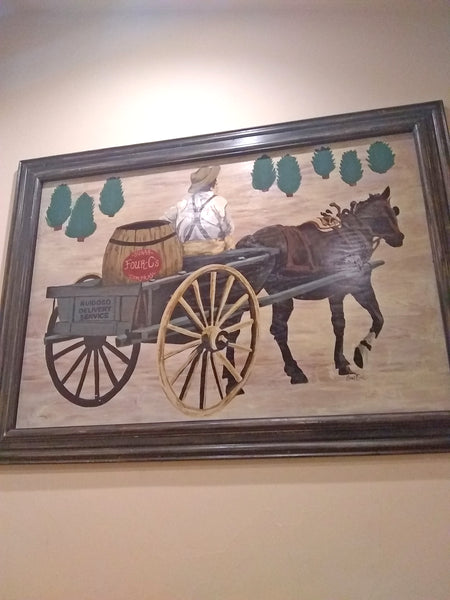
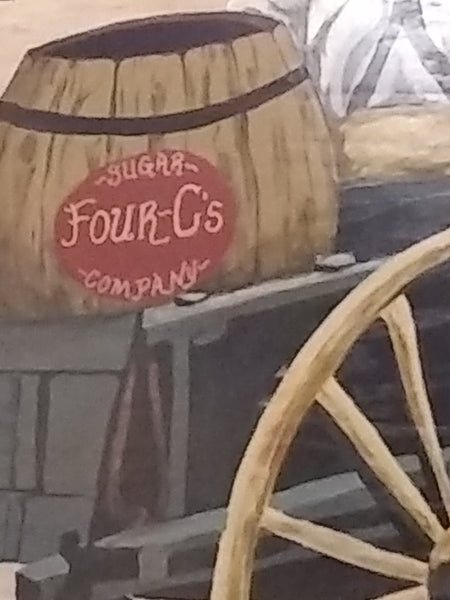
In the week before my dad passed my mom had my dad listen to and watch on You Tube Walter Brennan’s “Old Rivers” and Carleton Carpenter and Debbie Reynolds, “Abba Dabba Honeymoon” from Two Weeks with Love which have playful antics that I recognized from old home movies of my mom and dad when they were young and I had seen when I was making the opening credits for Road to El Paso. (Within several weeks Taylor would be copying those opening credits.) This was something already in motion. Within a week I would be driving my dad back the ranch road to "freshly plowed" ground.
The wild horses, which do not come around too often, came to my house while I was writing the book, and directly before and after my dad’s last birthday, which is November 19. They came November 10 and November 24, the white horse even walking up to my front steps.
Wild horses with white horse at my front porch 10 November 2018
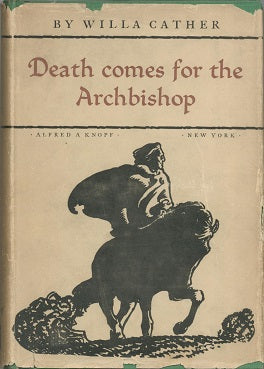
First edition, Willa Cather's Death Comes for the Archbishop
Carousel Horse built by Rawlyn Richter 1991
This is the carousel horse that is unpainted on top of the bookshelf in the pictures of me watching the blues players in 1991 with the "Dancing Bears" on Miracles at Isleta.
An Excerpt from On Being:
Outside of Austin where I first saw John, and the place Taylor's brother is named after, and I believe whose birth date matches that of the day John played his first showcase there, and perhaps one of John's brother's birth dates also matches (John's lyrics from "In the Blood" eloquently conjure, "How much like my brothers do my brothers wanna be?/ Does a broken home become another broken family?/ Or will we be there for each other like nobody ever could?/ Will it wash out in the water, or is it always in the blood?), are two towns along a highway that make up the name, Taylor and Camp Swift. Right above Taylor, Texas, is Circleville, much like Joni's "Circle Game," a brilliant response to Neil Young's "Sugar Mountain" that he wrote when he was nineteen about that "milestone" into adulthood ("Circle Game: Joni Mitchell's Response to Neil Young" https://www.youtube.com/watch?v=f04v8RN2_9 k Retrieved 2 December 2018).
Down the highway below that is another "Circle" place (named Circle D_KS Estates), the "circles" ("We're captive on the carousel of time/ We can't return we can only look behind/ From where we came/ And go round and round and round/ In the circle game") surround that small expanse of highway-- and show Taylor to be the impostor (and her parents)--that never encroaches on this spot where I first saw John at my very core in Austin (although she would try many times). But another, flowing line surrounds this outside attempt within, for outside of that is the river, the Brazos River, the "Arms of God" that have been with me my whole life as I grew up near its flowing banks since I was four. I inherited and my family has owned property on its waters since I was a child (where it was dammed in Granbury, the reason for the 1957 novel Goodbye to a River). I had passed John on the millennium right after his showcase, by about a month, at Stubb's Barbecue, on that very street, Red River, where I would finally see him ten years later in 2010--and where SRV had played four blocks away at Antone's Nightclub (which are also my initials, SR, along with and my mother's mother's maiden name, Vaughan)--and in the building, The Frank Erwin Center, which was built and opened in 1977, the year John and Kanye were born, in the very moment it was necessary for me to arrive, March 2010--the crux of the situation--without my planning. (I had been there at Stubb's on the millennium to see Russell Crowe play, and who had just filmed Gladiator and was about to film A Beautiful Mind.) At that time after I first saw John and was demonstrably blown away by his heart, when we were, apart, trying to figure out what to do about being stalked and falsely publicly slammed by Taylor, John followed his own internal voice, as he always has, and wrote Born & Raised, like Joni's and Neil's inspiration, even mentioning both of them on the album in his "Queen of California"; Joni for where John and I had first looked back at each other in British Columbia, and where she wrote Blue, and where I had begun the changed screenplay from a character I had written of in the years before, born with wings (the character in the screenplay is in gestation there in the Pacific North West [Vancouver]; the character binds her wings so as to hide them from an unseeing world, which Taylor took the idea for her cover art for Speak Now that October; but what I was writing John was very much on the order of his intrepid independent first album, Inside Wants Out), and as I was writing (and taking photographs) by the sea: "Joni wrote Blue in her house by the sea,/ I gotta believe there's another color waiting on me/ To set me free," like Joni's writing of her album, described as "turning the sadness into tender, universally powerful art" (https://genius.com/albums/Joni-mitchell/Blue Retrieved 7 December 2018); Genius.com adds: "Joni Mitchell told Rolling Stone in 1979:"
The Blue album, there’s hardly a dishonest note in the vocals. At that period of my life, I had no personal defenses. I felt like a cellophane wrapper on a pack of cigarettes. I felt like I had absolutely no secrets from the world, and I couldn’t pretend in my life to be strong. Or to be happy.'
Taylor took it as her own, untrue public script. But it was as I was writing John, openly telling him everything because he had opened me so, and it was flooding out. I had held it in too long. John was also referencing what Neil Young had done with his album After the Gold Rush, and as Genius.com states when "Neil Young went 'back to the basics'" (https://genius.com/John-mayer-queen-of-california-lyrics) in his lyrics "looking for the sun that Neil Young hung/ after the gold rush of 1971," a reference near to the time when I was born. John was communicating to me what he had to do, and in a most loving way, acknowledging what I was doing also, by staying true to himself and to the art. I had written to John in 2010 that I was looking "for a heart of gold"--a reference, of course, from Neil Young. James Taylor, whose name was disingenuously taken for Taylor's family's scheme, is on both of those albums, Joni's and Neil's, James Taylor being a dear friend of both--all of which have represented the integrity of music throughout their careers. In the BBC documentary Neil Young: Don't Be Denied, with Neil Young singing the lyrics of his "This Note's for You," James Taylor describes of Neil Young:
Neil will not have it. He simply won't have it. He won't take a sponsor and do that. You look at Elvis Presley, you got two good years, and then occasionally some great stuff, a lot of it is great because it's camp, but really they just did their best to shellac him, and bury him under two inches of acrylic or something. Neil is known as the ethical one, you know, the one who won't let business kill him.
Neil has said in many different ways, "My first job is to follow the musical course." John was set, as he always had been since he began playing guitar, on continuing the musical continuum with integrity and incorruptibility, following the path of the music, even at the hardest times, as when he was young and his parents were set against it, and as in 2010 and the public had fallen for Taylor's musical sham, when he would have to follow blindly, as he wrote in his new song, "I Guess I Just Feel Like" (2018): "And if I go blind I'll still find my way." The song is a lament at the lack of honesty, and of which he stated, “'I Guess I Just Feel Like' is the 'get small and tell the truth'” (https://genius.com/John-mayer-i-guess-i-just-feel-like-lyrics). I had also written to him in 2010 that I was "writing blindly," a reference to a letter a man wrote from a submarine that was doomed and all the lights and power were gone and he knew he wasn't going to survive. At that moment he wrote a letter to his wife in the dark, and said "I am writing blindly . . . " That was the beginning of John's journey into the dark unknown, but knowing he had to go, as he described in his "Walt Grace's Submarine Test, January 1967." The journey of which he writes in it is to Tokyo. (I did not know what would happen, or had happened.) While John was committed to this musical continuum, Taylor was determined to steal it all for herself, and to continually detract from it for her own personal gain, from John and from Kanye and from anyone else, because no one noticed what she was doing in the artifice, they just kept honoring because of what it all looked like. After John's album Born & Raised she took from Joni's Blue album in order to keep sticking it to John, from Joni's lyrics: "Hey, blue/ There is a song for you/ Ink on a pin/ Underneath the skin/ An empty space to fill in." John had written in his song to me, "A Face to Call Home," in December 2010: "You know my paper heart/ The one I filled with pencil marks/ I think I might have gone and inked you in." Taylor took on aspects to appear to look more like Joni and anonymously dropped rumors to the press that she was going to play Joni in the biopic Girls Like Us, a part she was never offered, but moving to essentially take Joni's identity in the press, as she had all along attempted to do to me since she first found me on-line, always stealing from the real, as she had started with on John a couple of years earlier, and to which Joni rightly responded in knowing that there was no substance there, "I don't know what her music sounds like, but I do know this – that if she's going to sing and play me, good luck" (Joni on Joni, Interviews and Encounters with Joni Mitchell) and later that, "I squelched that. I said to the producer, 'All you've got is a girl with high cheekbones'" (Rolling Stone https://www.rollingstone.com/movies/movie-news/joni-mitchell-reveals-why-she- n i x e d - t a y l o r - s w i f t - s t a r r i n g - b i o p i c - 5 8 1 3 1/ Retrieved 7 December 2018). When Taylor was not offered the part after her media blast giving herself the role because of John's album and giving herself the rights to the public identity of Joni in her "branding," she said in an interview what was another of her continually snide remarks congratulating herself on infringing copyrights and plagiarizing work and getting away with it (while being continually handed hordes of money and awards for it), and always in a saccharine manner admitting to it as if it made her more courageous while glossing it for interviews, and not in any intellectual or inventive way, as she perceived herself, as the snake in the grass. She told the press she had been reading scripts for five years, a reference to reading John's and my work, using it for her script, and most especially because I was writing screenplays, and that she could only comment on them if they "were real"--a reference to me writing to John that I wanted to write for life, for the real thing, from which she was taking her dialogue for her own biography. And of taking from Joni's copyrighted material, some small examples of the overall appropriation is lifted from Joni's lyrics from "Help Me" as Taylor's playbook for publicity, when Joni sings, "Help me/ I think I'm falling/ In love again/ When I get that crazy feeling, I know/ I'm in trouble again/ I'm in trouble" which became one of Taylor's lyrics, and "Help me/ I think I'm falling/ In love too fast/ It's got me hoping for the future/ And worrying about the past"--when Taylor was not actually having these relationships that were merely formulated for publicity, and Taylor, directly after John's references to Joni, telling the press, "I don’t think there’s an option for me to fall in love slowly, or at medium speed” (https://parade.com/ 131347/paradeeditor/08-taylor-swift-harry-styles- break-up/ Retreived 9 December 2018). Knowing on this end the manipulative acts Taylor was committing daily, including cyberstalking, love wasn’t even a subject. It was the furthest thing from what was actually happening. Nothing of what she says is true, it is stolen. She also believes the public will never catch on and stay in unawareness--the very opposite of what John, Kanye, Joni and the others are Being/doing and have been doing all their lives.
